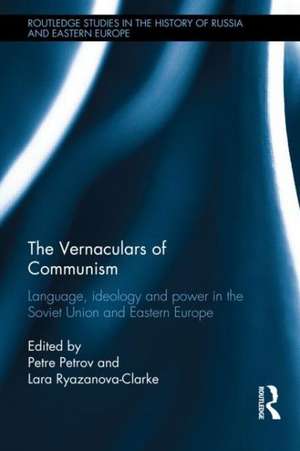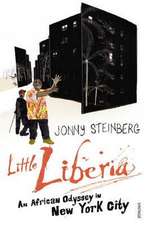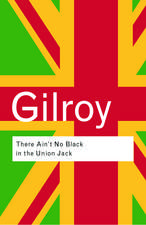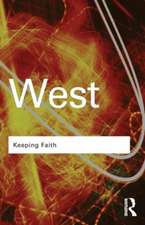The Vernaculars of Communism: Language, Ideology and Power in the Soviet Union and Eastern Europe: Routledge Studies in the History of Russia and Eastern Europe
Editat de Petre Petrov, Lara Ryazanova-Clarkeen Limba Engleză Hardback – 17 dec 2014
Petre Petrov is an Assistant Professor in the Department of Slavic Languages and Literatures at the University of Texas at Austin.
Lara Ryazanova-Clarke is Head of Russian and Academic Director of the Princess Dashkova Russia Centre in the School of Literatures, Languages and Cultures at the University of Edinburgh.
| Toate formatele și edițiile | Preț | Express |
|---|---|---|
| Paperback (1) | 449.41 lei 6-8 săpt. | |
| Taylor & Francis – 13 oct 2017 | 449.41 lei 6-8 săpt. | |
| Hardback (1) | 1273.35 lei 6-8 săpt. | |
| Taylor & Francis – 17 dec 2014 | 1273.35 lei 6-8 săpt. |
Din seria Routledge Studies in the History of Russia and Eastern Europe
- 15%
 Preț: 403.76 lei
Preț: 403.76 lei -
 Preț: 325.11 lei
Preț: 325.11 lei - 9%
 Preț: 1003.63 lei
Preț: 1003.63 lei -
 Preț: 284.52 lei
Preț: 284.52 lei - 14%
 Preț: 315.08 lei
Preț: 315.08 lei - 18%
 Preț: 1057.40 lei
Preț: 1057.40 lei -
 Preț: 427.12 lei
Preț: 427.12 lei - 14%
 Preț: 325.34 lei
Preț: 325.34 lei - 18%
 Preț: 273.05 lei
Preț: 273.05 lei - 18%
 Preț: 1279.68 lei
Preț: 1279.68 lei -
 Preț: 379.71 lei
Preț: 379.71 lei -
 Preț: 383.33 lei
Preț: 383.33 lei - 16%
 Preț: 325.34 lei
Preț: 325.34 lei - 18%
 Preț: 1056.28 lei
Preț: 1056.28 lei - 16%
 Preț: 274.06 lei
Preț: 274.06 lei - 18%
 Preț: 999.97 lei
Preț: 999.97 lei - 18%
 Preț: 1276.34 lei
Preț: 1276.34 lei - 18%
 Preț: 1000.27 lei
Preț: 1000.27 lei - 18%
 Preț: 1060.87 lei
Preț: 1060.87 lei -
 Preț: 463.58 lei
Preț: 463.58 lei - 14%
 Preț: 302.36 lei
Preț: 302.36 lei -
 Preț: 444.62 lei
Preț: 444.62 lei -
 Preț: 469.34 lei
Preț: 469.34 lei - 14%
 Preț: 301.13 lei
Preț: 301.13 lei -
 Preț: 416.22 lei
Preț: 416.22 lei -
 Preț: 462.81 lei
Preț: 462.81 lei - 14%
 Preț: 312.43 lei
Preț: 312.43 lei - 18%
 Preț: 1163.63 lei
Preț: 1163.63 lei -
 Preț: 442.50 lei
Preț: 442.50 lei - 26%
 Preț: 875.55 lei
Preț: 875.55 lei - 18%
 Preț: 1116.38 lei
Preț: 1116.38 lei - 18%
 Preț: 1107.75 lei
Preț: 1107.75 lei -
 Preț: 436.14 lei
Preț: 436.14 lei
Preț: 1273.35 lei
Preț vechi: 1552.87 lei
-18% Nou
Puncte Express: 1910
Preț estimativ în valută:
243.68€ • 264.61$ • 204.69£
243.68€ • 264.61$ • 204.69£
Carte tipărită la comandă
Livrare economică 22 aprilie-06 mai
Preluare comenzi: 021 569.72.76
Specificații
ISBN-13: 9781138792357
ISBN-10: 1138792357
Pagini: 244
Ilustrații: 2
Dimensiuni: 156 x 234 x 18 mm
Greutate: 0.48 kg
Ediția:1
Editura: Taylor & Francis
Colecția Routledge
Seria Routledge Studies in the History of Russia and Eastern Europe
Locul publicării:Oxford, United Kingdom
ISBN-10: 1138792357
Pagini: 244
Ilustrații: 2
Dimensiuni: 156 x 234 x 18 mm
Greutate: 0.48 kg
Ediția:1
Editura: Taylor & Francis
Colecția Routledge
Seria Routledge Studies in the History of Russia and Eastern Europe
Locul publicării:Oxford, United Kingdom
Public țintă
Postgraduate and UndergraduateCuprins
Introduction Part 1: Language Regimes of Stalinism 1. Linguistic Turn a la Soviétique: The Power of Grammar, and the Grammar of Power 2. The Soviet Gnomic: on the peculiarities of generic statements in Stalinist officialese 3. Aesopian language: the politics and poetics of naming the unnamable Part 2: Negotiating Codes of Communism in the Soviet Union and Eastern Europe 4. From subject of action to object of description: the classes in the Romanian official discourse during communism 5. Speaking Titoism: student opposition and the socialist language regime of Yugoslavia 6. Deviant dialectics: intertextuality, voice, and emotion in Czechoslovak Socialist 7. Birdwatchers of the world, unite!’ The language of Soviet ideology in translation Part 3: Soviet Vernaculars after Communism 8. Linguistic mnemonics: the communist language variety in contemporary Russian public discourse Lara 9. ‘The golden age of Soviet Antiquity’: sovietisms in the discourse of left-wing political movements in post-Soviet Russia, 1991-2013
Recenzii
"...this is a book that should be read not only by students of linguistics but also by anyone interested in the problems of the ‘captive mind’, so eloquently revealed at the time of Stalin’s death by Czesłw Miłsz."
Martin Dewhirst, University of Glasgow, Slavonic and East European Review
Martin Dewhirst, University of Glasgow, Slavonic and East European Review
Descriere
The political revolutions which established state socialism in the Soviet Union and Eastern Europe were accompanied by revolutions in the word, as the communist project implied not only remaking the world but also renaming it. As new institutions, social roles, rituals and behaviours emerged, so did language practices that designated, articulated and performed these phenomena. This book examines the use of communist language in the Stalinist and post-Stalinist periods. It goes beyond characterising this linguistic variety as crude "newspeak", showing how official language was much more complex – the medium through which important political-ideological messages were elaborated, transmitted and also contested, revealing contradictions, discursive cleavages and performative variations. The book examines the subject comparatively across a range of East European countries besides the Soviet Union, and draws on perspectives from a range of scholarly disciplines – sociolinguistics, anthropology, literary and cultural studies, historiography, and translation studies.















